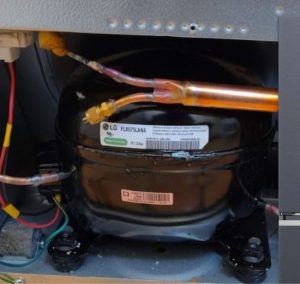Your refrigerator relies on many components to keep your food cool and allow it to last. When one of these parts malfunctions, it can lead to a domino effect that will result in such problems as food spoilage. One of the most essential parts of a refrigerator is its compressor. The refrigerator compressor controls how refrigerant moves throughout the refrigerator, so it’s important to recognize when this part fails. Continue reading to learn how a refrigerator compressor works and the six main signs of a failing refrigerator compressor.
How Does A Refrigerator Compressor Work?
As stated earlier, the refrigerator compressor helps the refrigerant travel throughout the refrigerator unit. In order to recognize when a refrigerator compressor fails, you first need to know how this part works. First, the compressor will take the refrigerant in its gas form, where the pressure and temperature are raised. As the refrigerant puts pressure on this gas, it is released through the condenser coils, turning it into a liquid.
When the refrigerant is fully in liquid form, it travels to the expansion valve, allowing it to turn back into gas since it absorbs any excess heat in the refrigerator. In other words, the liquid refrigerant soaks up the heat that turns it into a gas form in order to keep the interior temperature of the refrigerator nice and cool. The excess heat is sent back into the compressor, where the cycle continues.
6 Refrigerator Compressor Failure Signs
Now that you understand how the compressor regulates a refrigerator’s internal temperature, you are ready to learn the six refrigerator compressor failure signs. You will also learn what these failure signs mean and how you can take action.
1. Humming And Buzzing Sounds
When your refrigerator makes sounds, it’s trying to tell you something is amiss. Where your refrigerator compressor is concerned, you will likely hear persistent humming and buzzing sounds. These noises are a sign that the compressor has sustained extensive wear and tear and might be nearing the end of its lifespan. In this instance, depending on the severity of the wear and tear, you might be better off replacing your refrigerator compressor than repairing it.
2. Overheating
Your refrigerator compressor is struggling if your fridge’s internal temperature is overheating. The overheating can be attributed to wear and tear or a shortage of refrigerant that allows the compressor to stabilize the temperature. Factors such as the make and model of the compressor and its age will determine whether or not this part needs repairs or replacement.
3. Inability To Cool
Even if your refrigerator isn’t overheating, you shouldn’t ignore any signs that it’s struggling to maintain the appropriate range of cool temperatures. This activity might mean the back of the fridge is dirty. Otherwise, it might still be a sign of a malfunctioning compressor needing urgent repairs.
4. Food Spoilage And Ice Build-Up
If you fail to catch the earlier signs of refrigerator compressor failure, opening your fridge to find excessive ice and spoiled food will leave no doubt in your mind that something isn’t right. As soon as this happens, throw away any spoiled food and store food that is still in good shape with a friend or family member until a technician can diagnose and address the problem.
5. The Power Keeps Turning On And Off
Does your refrigerator have a hard time turning and staying on? Does it start and stop more often than normal? These might be indicators of a compressor’s start relay needing repairs or replacement or a more severe problem with the compressor, especially if the internal temperature is also being affected. You’ll need a refrigerator technician to check it out as soon as possible.
6. High Energy Bills
If your energy bills are higher than usual, it could be due to your refrigerator’s compressor being forced to overwork itself. Your compressor will start using more energy if there is excessive dirt and debris on the condenser coils or if your refrigerator has temperature problems. Whatever the cause, high energy bills are a sign that your refrigerator needs attention.
When Your Refrigerator Compressor Fails, Take Action!
Knowing what the refrigerator compressor does and its failure signs will allow you to take better care of this appliance than before. You need to take action if you have noticed any of the six refrigerator compressor failure signs. Whether your compressor is about to fail or has already failed, Appliance Repair Weston will have your back. Contact us today so you can keep your refrigerator compressor up and running.


